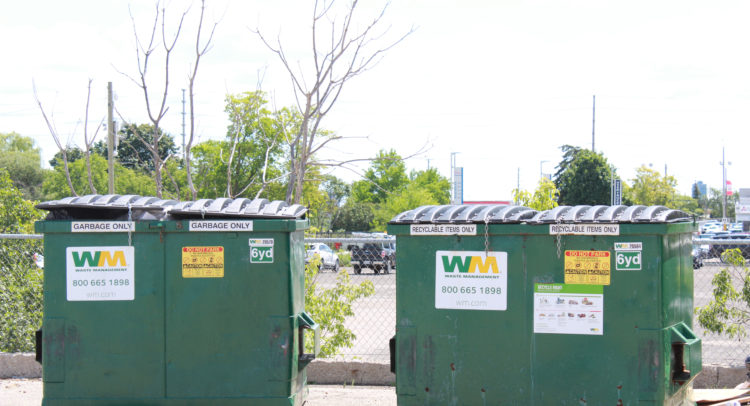Waste Management (WM) is the prime provider of all-inclusive waste management environmental services in North America, with a leading position in the United States and Canada. The company signs partnership deals with residential, commercial, industrial, and municipal customers to handle and downsize waste.
Over the years, Waste Management has vertically integrated its operations to benefit from the collection phase to the disposal phase while simultaneously salvaging valuable resources and producing clean, renewable energy. I am neutral on the stock.
Waste Management’s Competitive Advantage
Waste Management operates the most extensive network of landfills throughout the U.S. and Canada. Therefore, the company has been able to unlock advantageous operating efficiencies as a result of vertically integrating its procedures and achieving economies of scale.
For instance, larger urban markets are quite distanced from landfills. For that, the company manages transfer stations that consolidate, compact, and transport waste efficiently in outer drop-off locations.
Another example is that the company utilizes waste to create energy, recovering the gas produced naturally as waste decomposes in landfills. The gas can then be used in generators to produce electricity or natural gas and even be utilized to power the company’s operations. Thus, the company has created a robust end-to-end ecosystem where value is created between every stage of waste management.
Waste Management features a broad moat as well, further boosting its competitive advantage. In fact, Waste Management, Republic Services (RSG), Waste Connections (WCN), and municipalities have a combined market share of 84% in the United States.
With the business model being CapEx-intensive and the industry leaders (especially Waste Management with a 29% market share) usually acquiring any small disruptors, the industry is protected by virtually unbreachable entry barriers.
Combined with the fact that the trash business is recession-proof and that future revenues are usually locked in by multi-year contracts by quality counterparties, including governmental entities, Waste Management enjoys extremely resilient cash flows.
Recent Performance
Waste Management’s quality cash flow generation was once again demonstrated in its latest results. Revenues grew 13.3% to $4.66 billion, backed by higher pricing power, boosted processing volumes, and a bulkier disposal yield.
Specifically, core price growth of 7.3% was more than double that of the same quarter in 2021, as management focused on securing price hikes that keep pace with the inflationary environment. Following strong pricing results across all lines of business, the company achieved a collection and disposal yield of 5.5% compared to 2.8% last year. Finally, processing volumes increased 3.6% year-over-year, reflecting the gradual growth in human and industrial waste over time (e.g., resulting from population growth).
Besides Waste Management’s capability of negotiating price increases that mostly match inflation, the company was able to handle the inflationary pressures on its own operating costs sufficiently.
Adjusted operating expenses were 62.3% of revenue in the first quarter. This implies only a 120 basis points increase year-over-year, which is substantially lower than inflation. More impressively, operating costs improved 70 basis points sequentially, despite inflation accelerating during the past quarter, as we know.
Consequently, while adjusted operating EBITDA margins declined 60 basis points year-over-year, adjusted operating EBITDA grew 10.7% to $1.29 billion. Following lower interest expenses and softer losses on equity of unconsolidated entities, adjusted earnings per share rose 21.7% to $1.29.
Based on its Q1 results, management mentioned that it remains on track to comfortably achieve its prior full-year guidance. The company had shared its full-year during its Q4 results, and it included targeted adjusted operating EBITDA in the range of $5.325 to $5.425 billion.
Is the Stock Fairly Valued?
Waste Management displays unique qualities that investors highly appreciate during the ongoing, highly-volatile environment. Due to its critical-for-society operations, the company is set to generate robust revenues effectively under any economic environment. For this reason, investors have been willing to pay a premium for the stock.
This trend has persisted over the past few years and was even further strengthened during the highly uncertain environment of the pandemic. Specifically, Waste Management’s forward P/E has expanded from the low 20s in 2017 to about 28 nowadays.
Clearly, this makes for a rich multiple during a rising-rate environment, which I would argue that it overvalues the stock despite its otherwise attractive traits.
The increasingly higher multiple on the stock has also resulted in a declining dividend yield despite Waste Management’s rapid dividend increases. The company has raised its dividend per share annually for 19 years, with the latest hike being by a pleasing 13%. Yet, the stock’s yield has been compressed from around 2.4% to about 1.6% over the past five years.

Thus investors’ margin of safety is notably lower today as the tangible capital returns are clearly inferior. During Q1, Waste Management allocated $250 million in stock repurchases, equal to last year’s Q1. Yet, repurchases are less efficient when shares trade at a higher multiple, resulting in weaker shareholder value creation.
Wall Street’s Take
Turning to Wall Street, Waste Management has a Moderate Buy consensus rating based on four Buys, six Holds, and one Sell assigned in the past three months. At $170.10, the average Waste Management price forecast implies 7.3% upside potential.

Takeaway
Overall, Waste Management features a number of attractive characteristics, including operating excellence, a wide moat, a quality customer base, and superb pricing power. The company should keep posting very strong results even if the underlying economy were to slow down substantially in the coming quarters.
However, as investors have found sanctuary in Waste Management’s quality attributes, its valuation has expanded substantially, leading to the stock being rather overvalued, in my view. For this reason, I am neutral on the stock and point out that investors be wary of the valuation compression risks ahead.
Discover new investment ideas with data you can trust.
Read full Disclaimer & Disclosure









